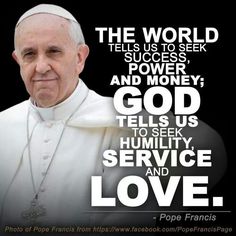Who is Pope Francis? Ultimately, he is a pastor who is concerned that his sheep are called to the fullness of the Christian life. He does not spend a lot of time on culture war politics, because he has the deeper calling to ensure that the sheep make it to the fold. And, he has been wise enough to state that the culture war approach to Catholicism has only left a shrill impression, in the mind of many unchurched, of what Christianity is. But, Christianity is more than shrillness and demonstrations, and refusals. It is transformation, joy, peace, love, gentleness, long-suffering, etc. It is also service, service to all those who need us to serve them so that they may know that God is Love, and be willing to come to him.
So, what did Pope Francis say?
A political society endures when it seeks a rationale to satisfy common needs by stimulating the role of all its members especially those in situations of great vulnerability or risk. Legislative activity is always best if they care of the people.
So this you have been invited, called, a commitment by those who elect you. Yours is a walk which makes me reflect in two ways in the figure of Moses.
The one, the patriarch and (inaudible) of the people of Israel, symbolizes the need of people to keep alive their sense of unity by means of just legislation. On the other, the figure of Moses lifts us directly to God and thus, with the threshold of dignity of the human being.
Moses, provides us with a God’s synthesis of a walk. We are asked to protect by means of the law, the image and likeness fashioned by God on every human life.
Who would have thought that Pope Francis would compare American politicians, nay all politicians, to Moses! There is little doubt that Pope Francis has read Romans 13. “Let everyone be subject to the governing authorities, for there is no authority except that which God has established. The authorities that exist have been established by God.” This is a phenomenal elevation of the role of a politician. I must admit to having posted many a satirical and disgusted meme on Facebook about some political shenanigans or other. But, after Pope Francis spoke these words, I found myself wondering whether I need to be cautious how I address politicians.
In one sense, if I give the impression that politicians are simply some type of human flotsam, then I fail to recognize that they are, in a sense, God-called. Cyrus, that great conqueror, is called anointed of God in the Old Testament. Not that he was a believer, but that God had placed him in a position on the world stage in which his actions where going to accomplish something of God’s will. Meantime, Pope Francis looked at these politicians, who may shut down our nation in just a week, and told them that they had a calling, that they were to reflect Moses, that they had their part in protecting, “the image and likeness fashioned by god on every human life.” That is a completely different way to address a politician. You are called to be a Moses and to help set people free. That is better than some of the names I have thought about for politicians!
But, as I said earlier, Pope Francis made me realize that I need to rethink how I address politicians. If I do not have a correct view of what a politician’s calling is, then how can I communicate that in my sermons? (Not that I spend a lot of time talking about politicians!) If I do not have a correct view of what a politician’s calling is, then how can I know if they have fallen away from it. If my view is not the view of Romans 13, then how can I speak of proper respect and of what God is accomplishing through government? If my view is incorrectly low, then do I not end up being one of those who tears apart rather than puts together? Am I not in danger of misinterpreting what true law and order is about?
Yes, Pope Francis has left me much to think about. Thank you, Pope!




Leave a Reply